Patek Philippe Pilot Travel Time Chronograph Reviewed by Tim Mosso
by Tim Mosso
There’s nothing practical about a $76,000 watch – at least not in the big frame. But in the context of expensive man jewelry, some options are more useful than others. That’s where the Patek Philippe Pilot Travel Time Chronograph enters the small frame.
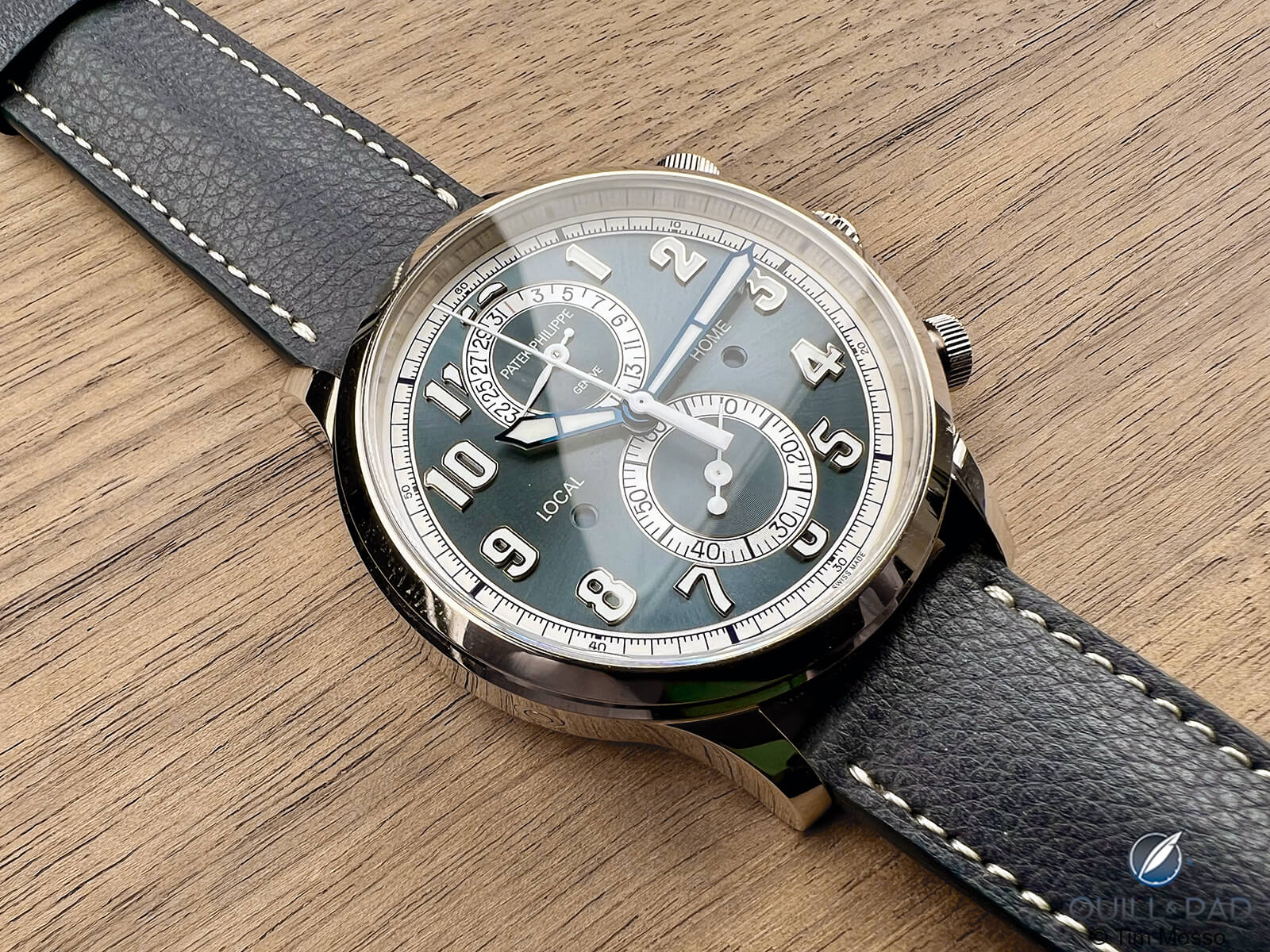
Patek Philippe Pilot Travel Time Chronograph
With tons of lume, a legible dial, two time zones, and a flyback chronograph, the 5924G arms you with – at least – a plausible excuse the day this 401K-killer follows you home unannounced.
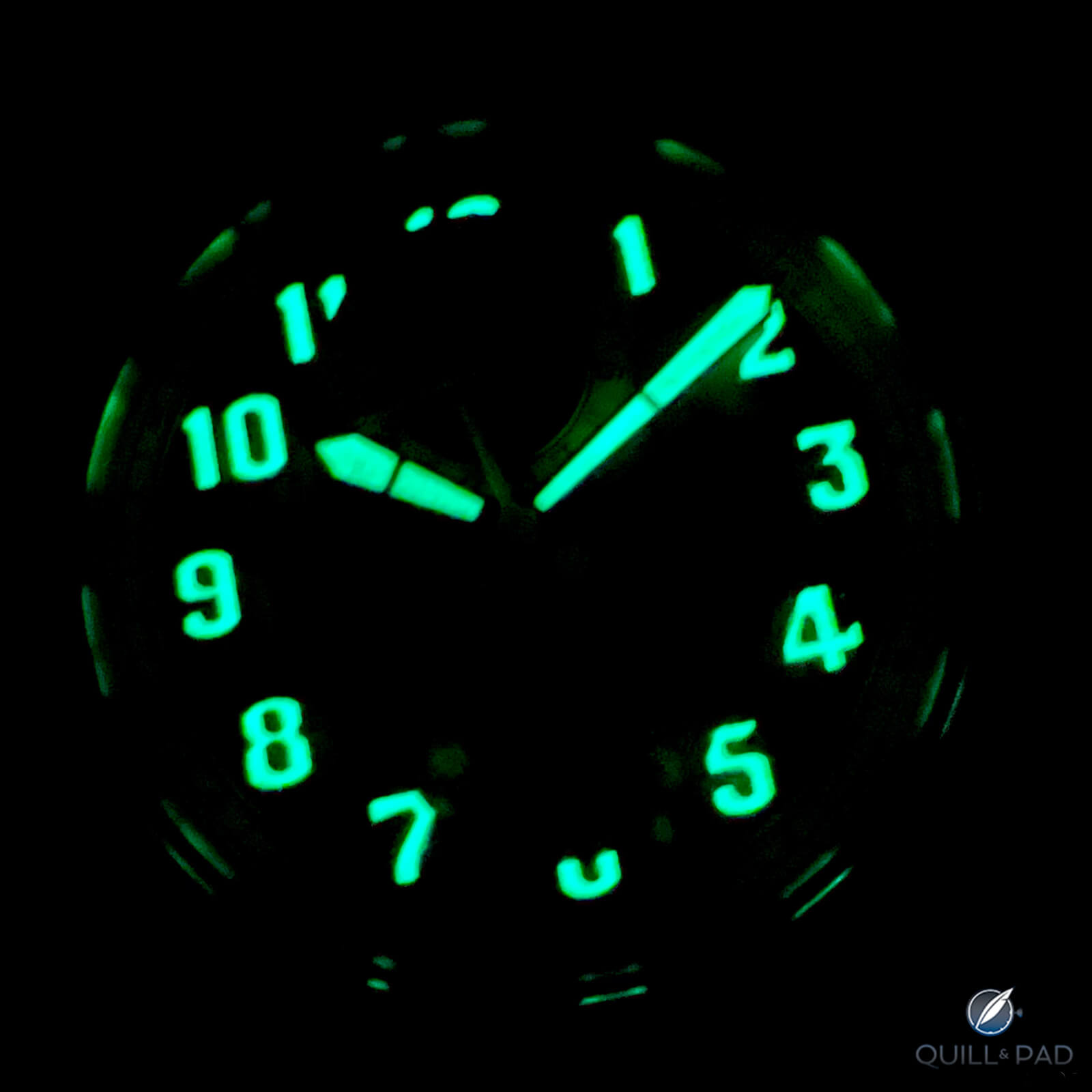
Ample lume on the Patek Philippe Pilot Travel Time Chronograph
Patek Philippe has no real history of pilot’s wristwatches. Aside from a sideways glance at some museum-piece rarities, Patek’s main argument behind its 2015 genre debut was opulence. Without a doubt, the Calatrava Pilot 5524G was the poshest pilot of its day. Even in a world where Richard Mille co-brands with Airbus, there was an old-world hauteur to the Patek that no utensil-like RM could approach.
At the time, Patek’s entry into a space dominated by IWC, Sinn, and Breitling was controversial. But with over half a dozen references and counting in the “Pilot” series, the unlikely Patek has flexed its staying power.
For 2023, the debut 5924 entered the picture with a useful combination of traits and a march upmarket for the Pilot series. No longer technically a “Calatrava,” the Pilot Travel Time Chronograph – hereafter, PTTC – moves up to the amorphously defined “Complications” collection.
The new nomenclature fits, but owners can fully expect to be asked about their “Calatrava Pilots” by all who know enough to ask but too little to hit the mark unaided. It doesn’t matter; this is a watch any collector worth his chrono24 account will love to explain.
It’s worthwhile highlighting the three clear strikes against this model. First, the ghosts of 2015 still haunt this series, and plenty of onlookers and cranks will comment that it looks like a Zenith/Longines/IWC.
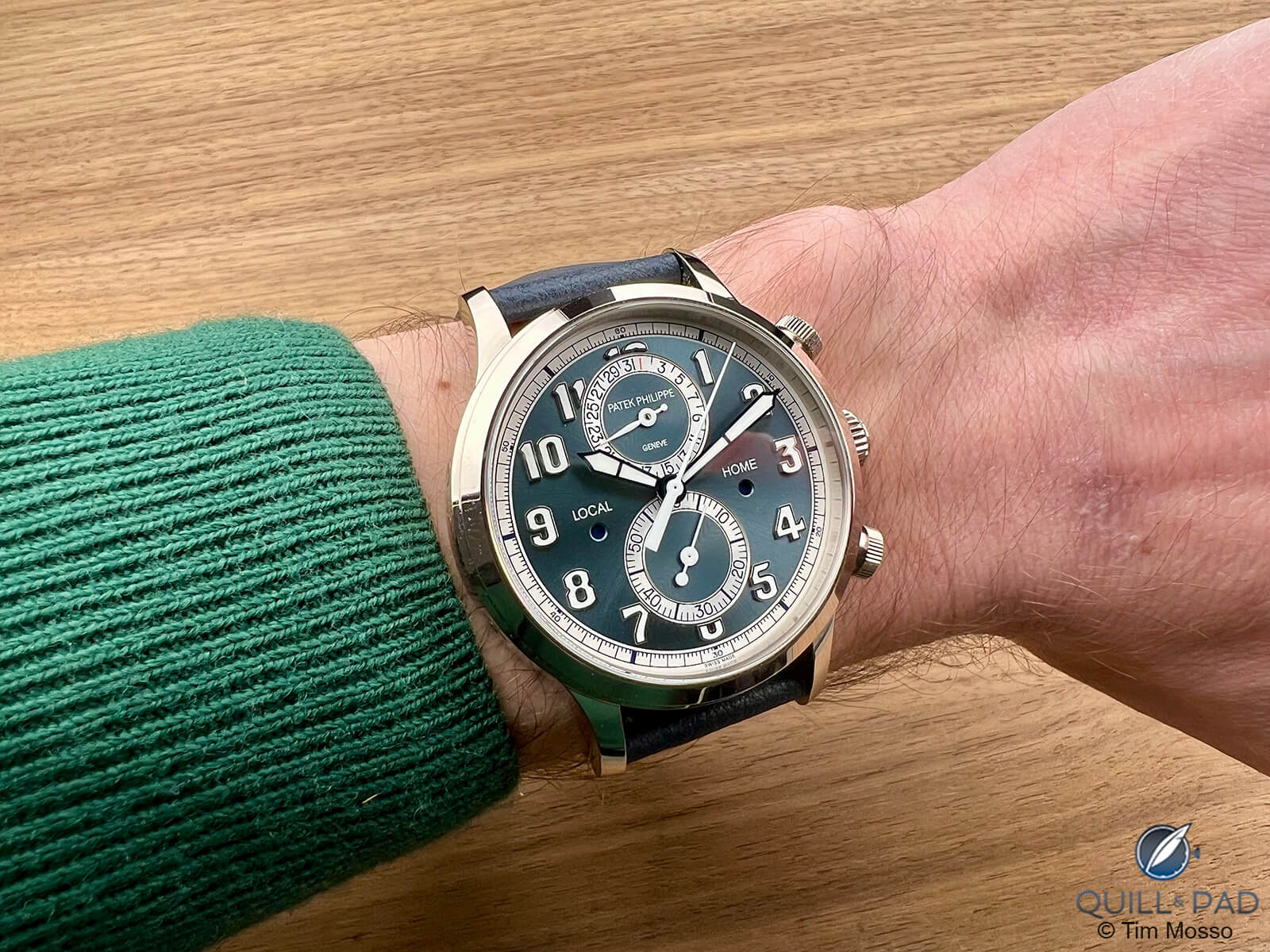
Patek Philippe Pilot Travel Time Chronograph on the author’s 16 cm wrist
Second, the 52mm lug-to-lug means that the 42mm case diameter understates the bulk and footprint of this machine. Bigger wrists will enjoy it most, and my 16cm forearm appears here forearmed to tell the tale.
Finally, the watch is basically a Nautilus 5990 in a bulkier box with less water resistance, a stylus-reliant dual time, and no bracelet.
Each of the above critiques is valid. But the PTTC is a dogfighter by name and nature. It’s far easier to read than a 5990 by day; when lumed, the 5924G makes any Nautilus look like an ISS snapshot of North Korea at night. Straps have a following, and pilot’s watch enthusiasts generally march in solidarity with Paneristi – sharing their mutual affection for hide.
And, for all the hype, there’s a ton of Nautilus hardware floating around; most versions of the Patek Pilots are – relatively – uncommon by comparison.
Let’s start from the outside and work our way in.
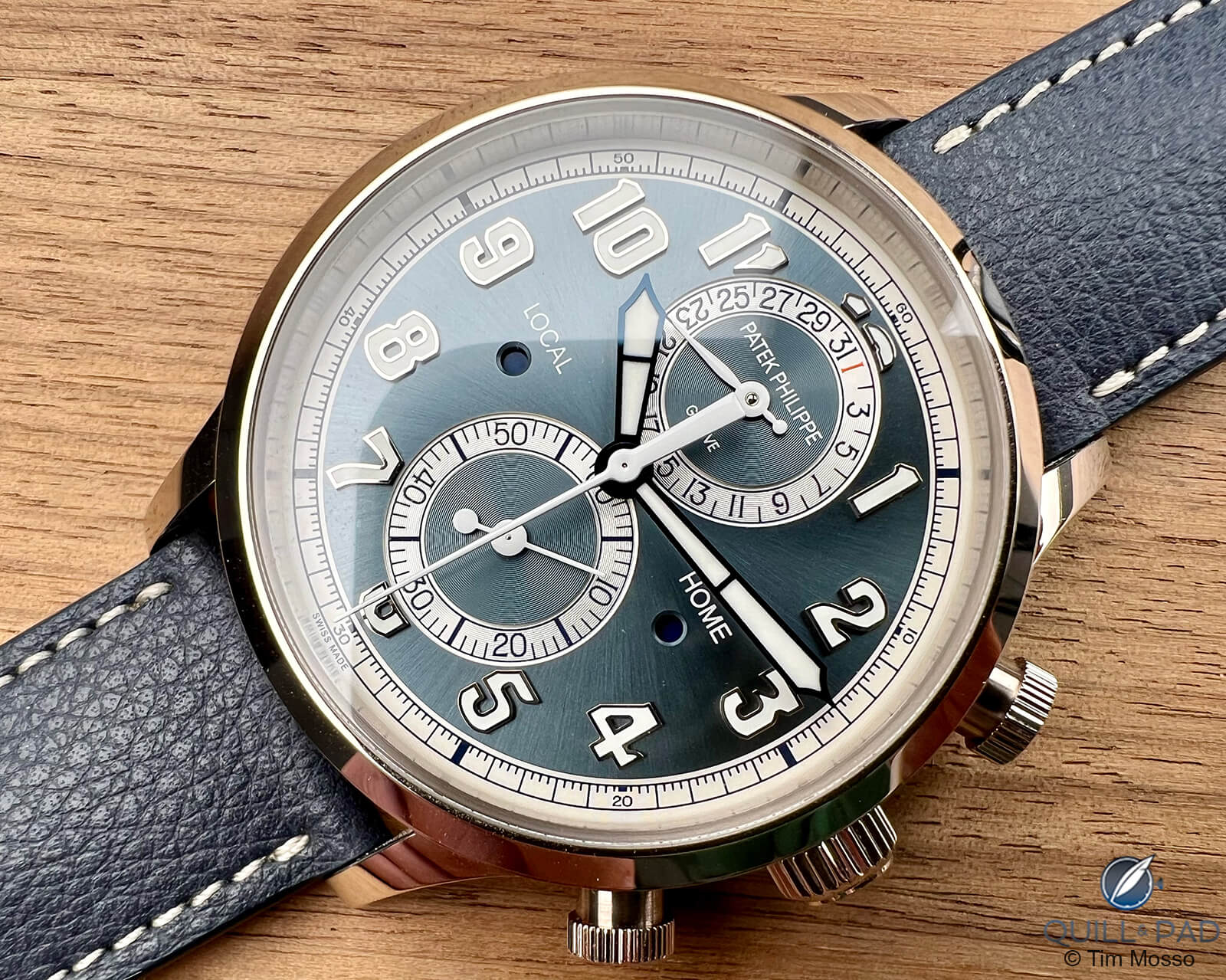
Patek Philippe Pilot Travel Time Chronograph
White gold is the rule for the first-generation of CTTP. A green dial is available, but today’s “blue-grey” metallic sunburst feels like the betting man’s choice to age more gracefully. Green is cool for now, but there must be a reason it’s historically rare on watches. Give the market a few more months, and popular tastes have every chance of reverting to type.
On the featured variant, hands are handsomely standard broadswords with blued surfaces for the hours and minutes; second time zone and sub-dials get white lacquered surfacing.
White gold appliqué Arabic numerals look fantastic, and the applied gold figures impart the impression of luxury often missing in the printed-dial pilot genre.
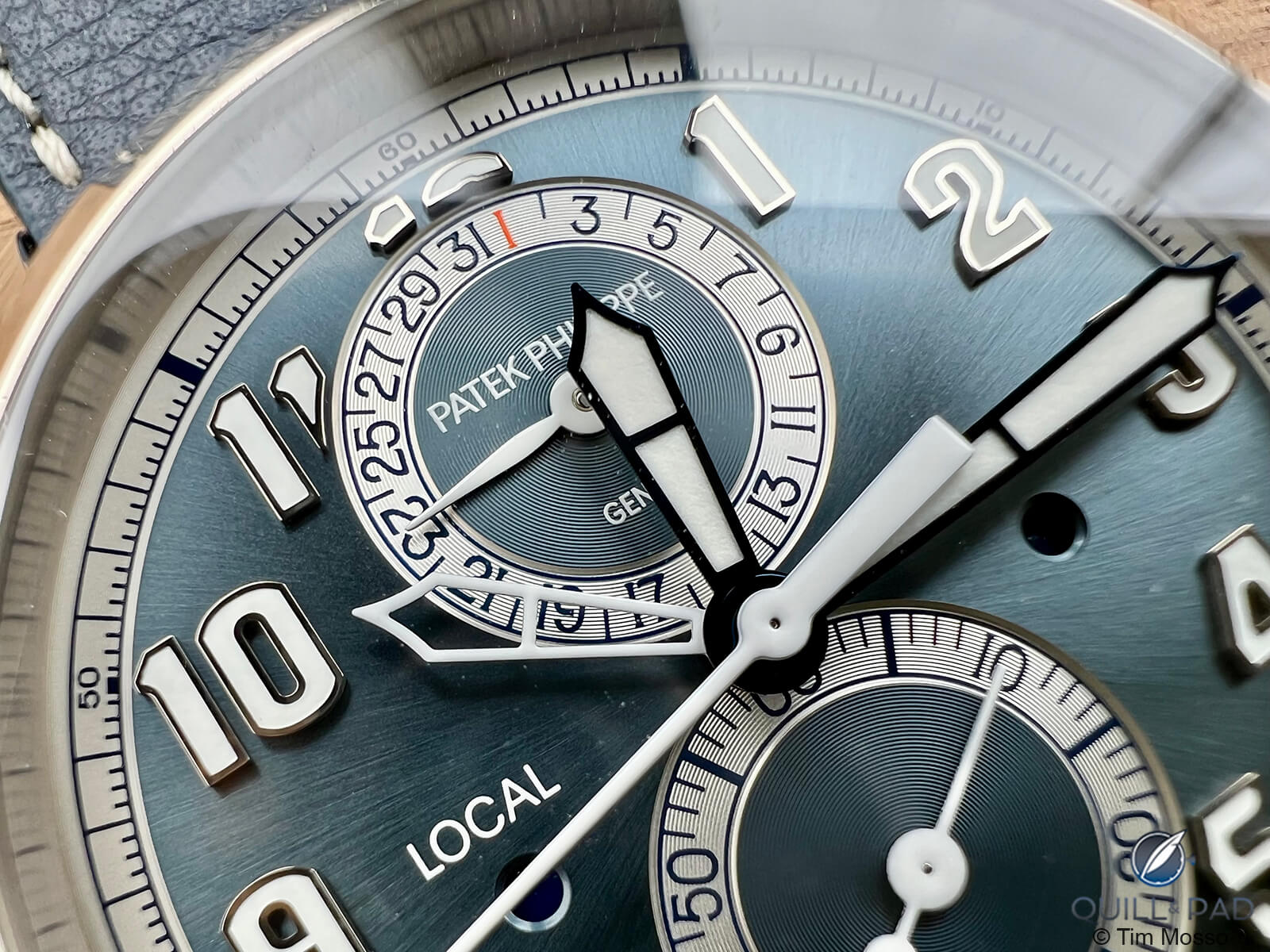
Patek Philippe Pilot Travel Time Chronograph
This is one clean dial. Patek’s decades-old convention of pairing two 12-hour hands with am/pm sub-dials permits easy reduction of clutter when the second zone is not needed. A 60-minute chronograph register is a brilliant inclusion given how many chrono-friendly tasks are measured within the 30-60-minute span generally unavailable on chronographs.
However, that’s all you get, so anyone with a need to read elapsed hours will need to dig deeper into the Patek catalog.
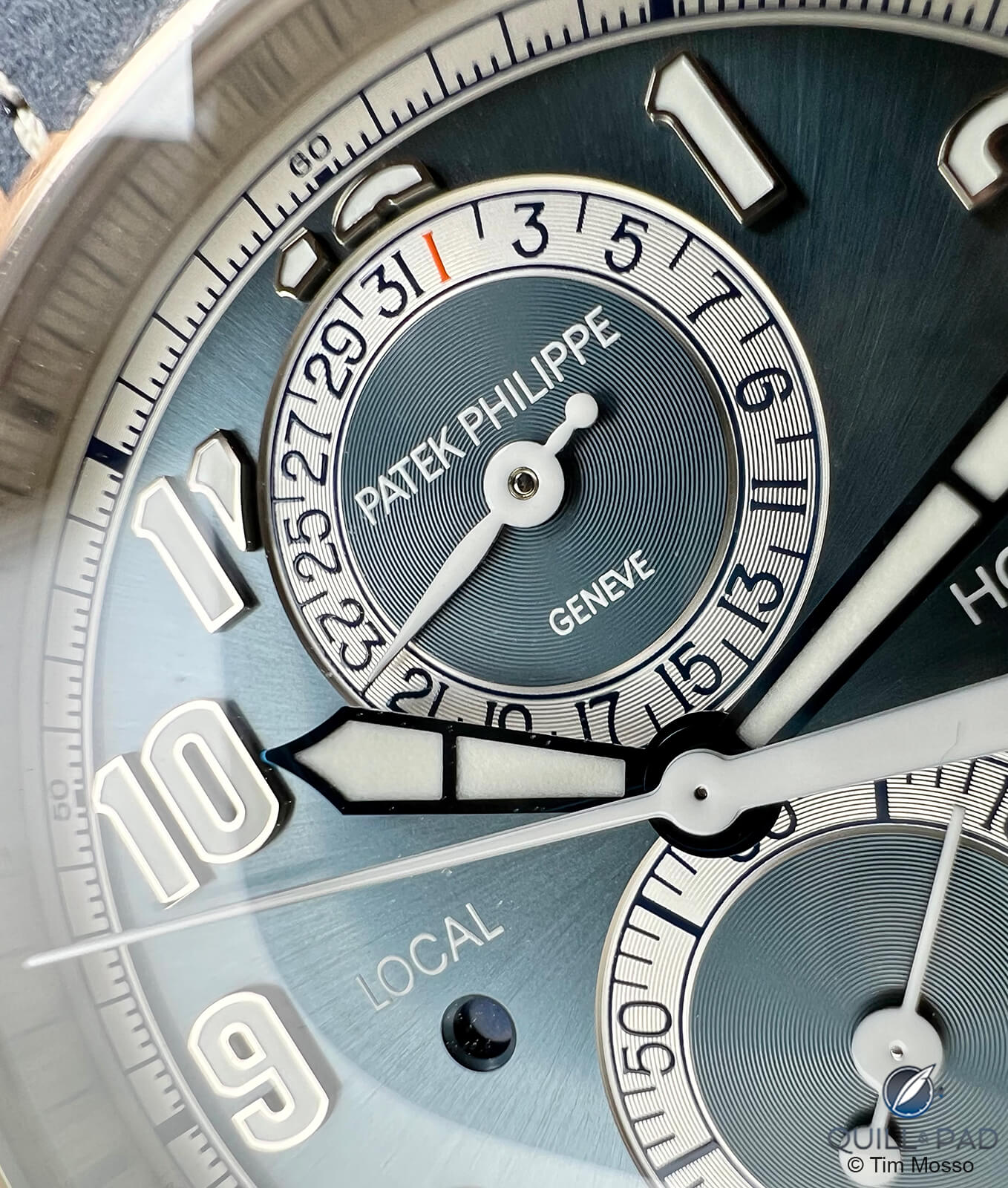
Patek Philippe Pilot Travel Time Chronograph
There’s a pointer date at twelve that can be advanced one of three ways, and none is ideal.
First, the legacy of the 5960 annual calendar is that any watch using a variant of its then breakthrough caliber 28-520 must also use the dimple-pusher date advance of the annual calendar system. Since this requires a stylus, you might conclude that advancing the date could be achieved by jumping the local hour hand.
Unfortunately, this also requires a tool, since Patek appears to have re-thought the crowns über alles look of the 5520.
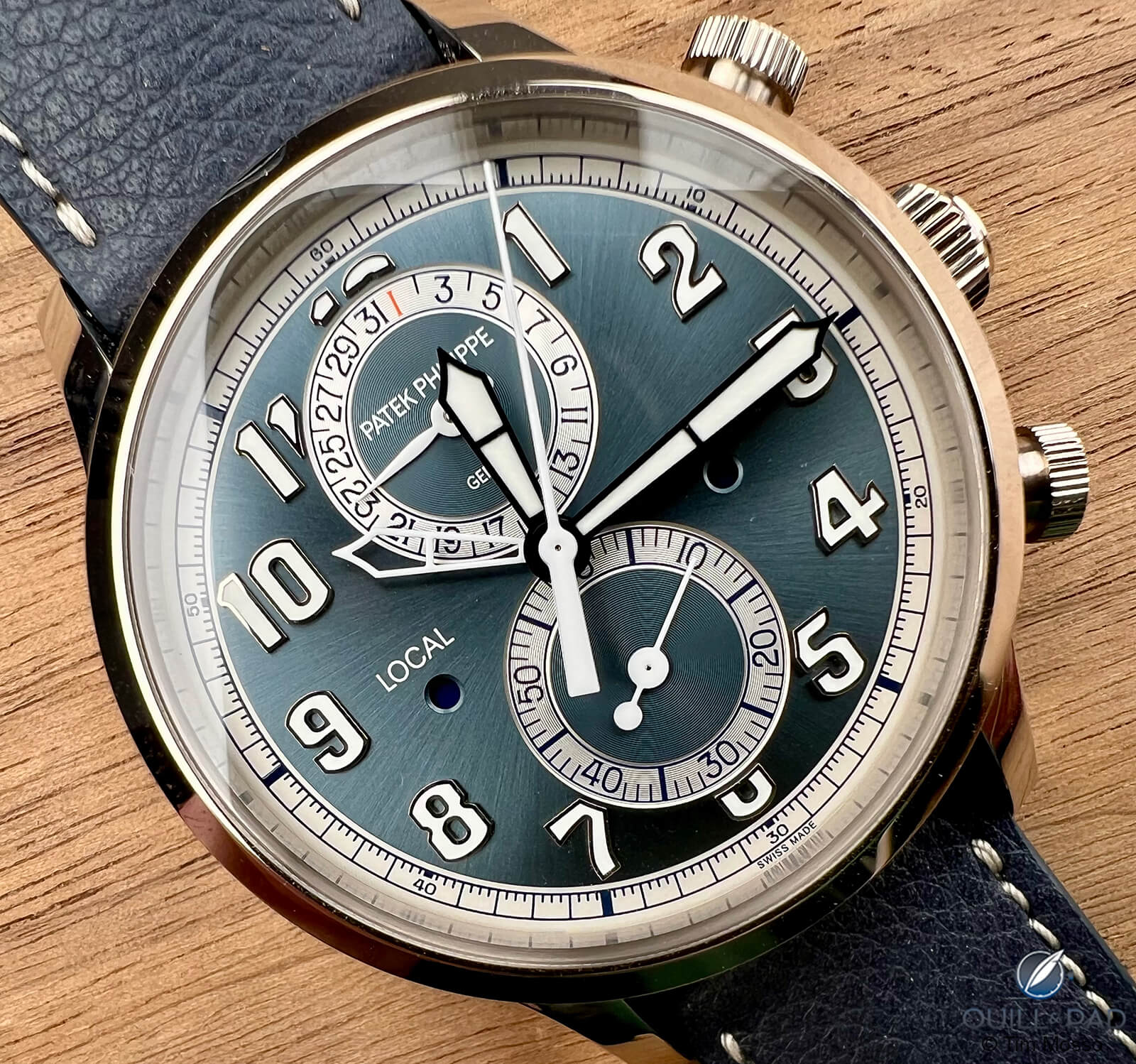
Patek Philippe Pilot Travel Time Chronograph
The CTTP gets two chronograph pushers, a crown for winding and setting… and that’s it. Any crown-based adjustment of the date requires moving both hour hands simultaneously. It’s the largest functional failure of this design.
Internally, things look more appealing. Caliber CH 28-520 C FUS is a flyback chronograph with a healthy roster of refinements. Flyback action is ideal for timing rapid-fire events – such as aviation maneuvers – that a user may wish to track.
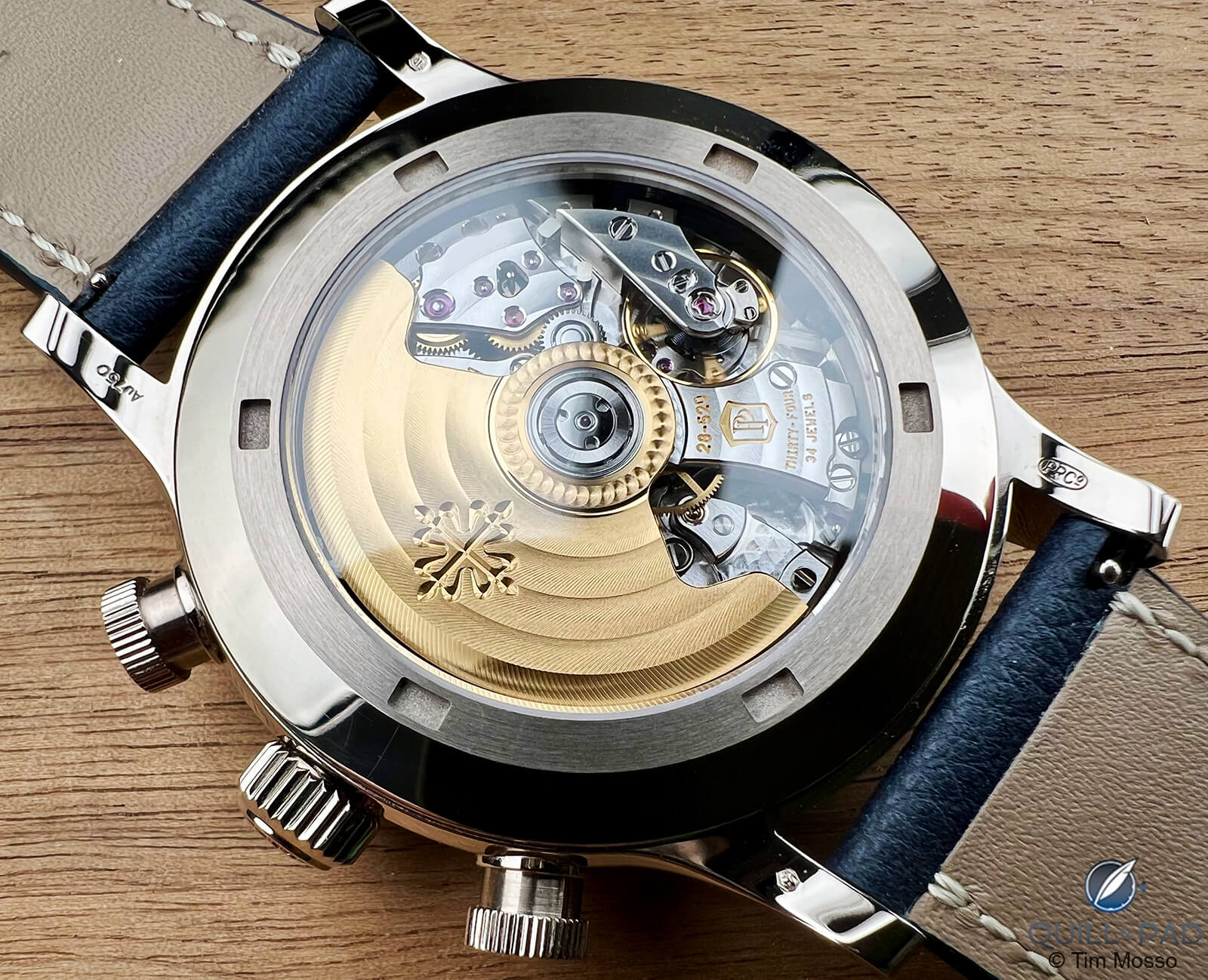
Movement of the Patek Philippe Pilot Travel Time Chronograph
With no need to stop, reset, or restart manually, the flyback also doubles as a zero-reset seconds mechanism for those who wish to use the chronograph seconds constantly on a watch with no running seconds hand.
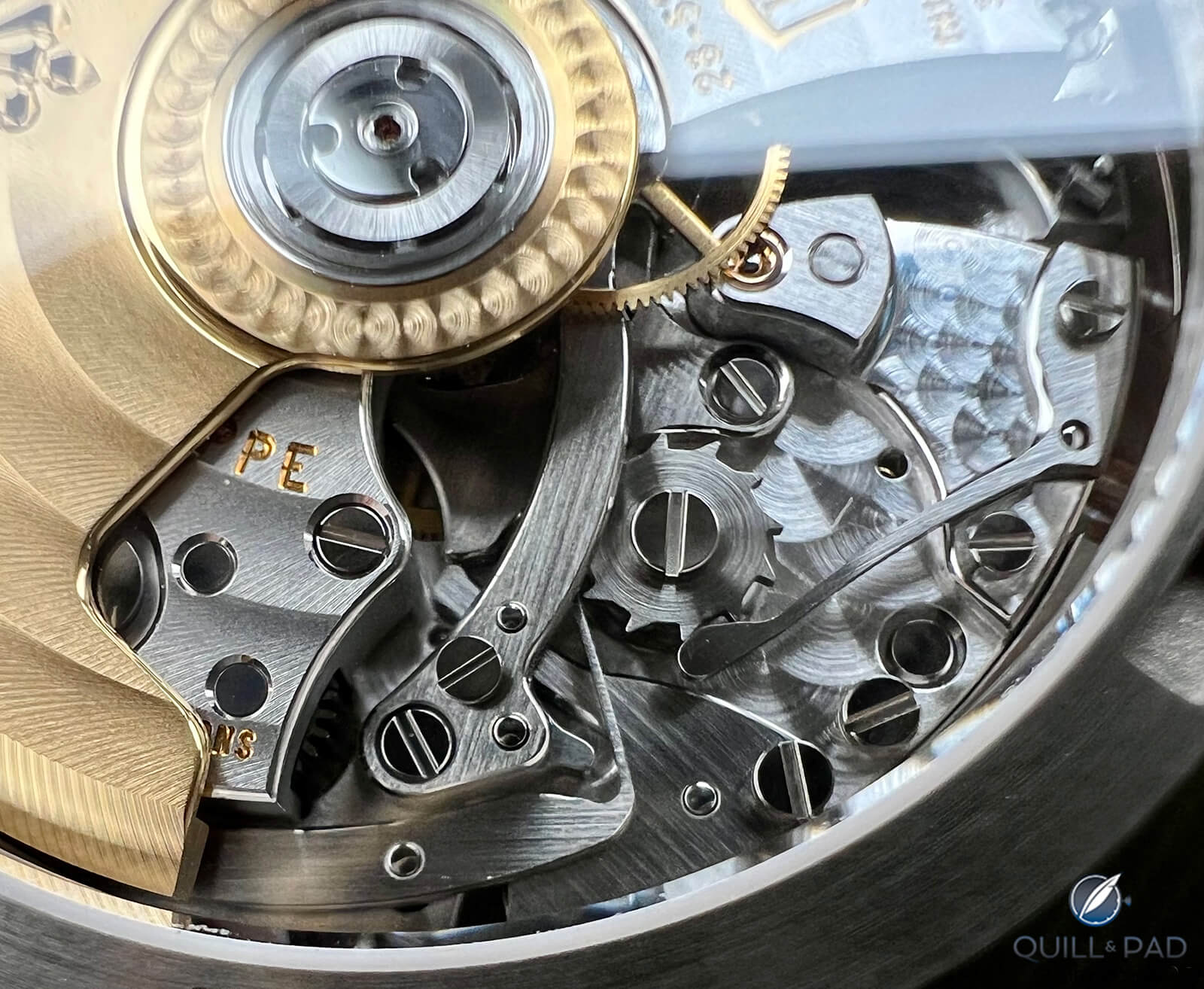
Star-like column wheel of the Patek Philippe Pilot Travel Time Chronograph
Due to the presence of a vertical clutch, the constant operation of the chrono poses no threat to this caliber. Column wheel action is crisp, and the feel is commensurate to the price of the watch. That said, the star-like column wheel is a bit of a visual oddity on the caseback, and a first-timer might even struggle to spot the wheel if scanning for a traditional crenelated turret.
Patek’s original 2006 version of the 28-520 was quite a bit different than this one. Along with a Geneva hallmark rather than Patek seal, the original featured a metallic overcoil hairspring and five-position adjustment.
While less romantic, the new Patek-sealed, 6 position adjusted, and silicon sprung 28-520 gains a factory accuracy declaration never attributed to the original.
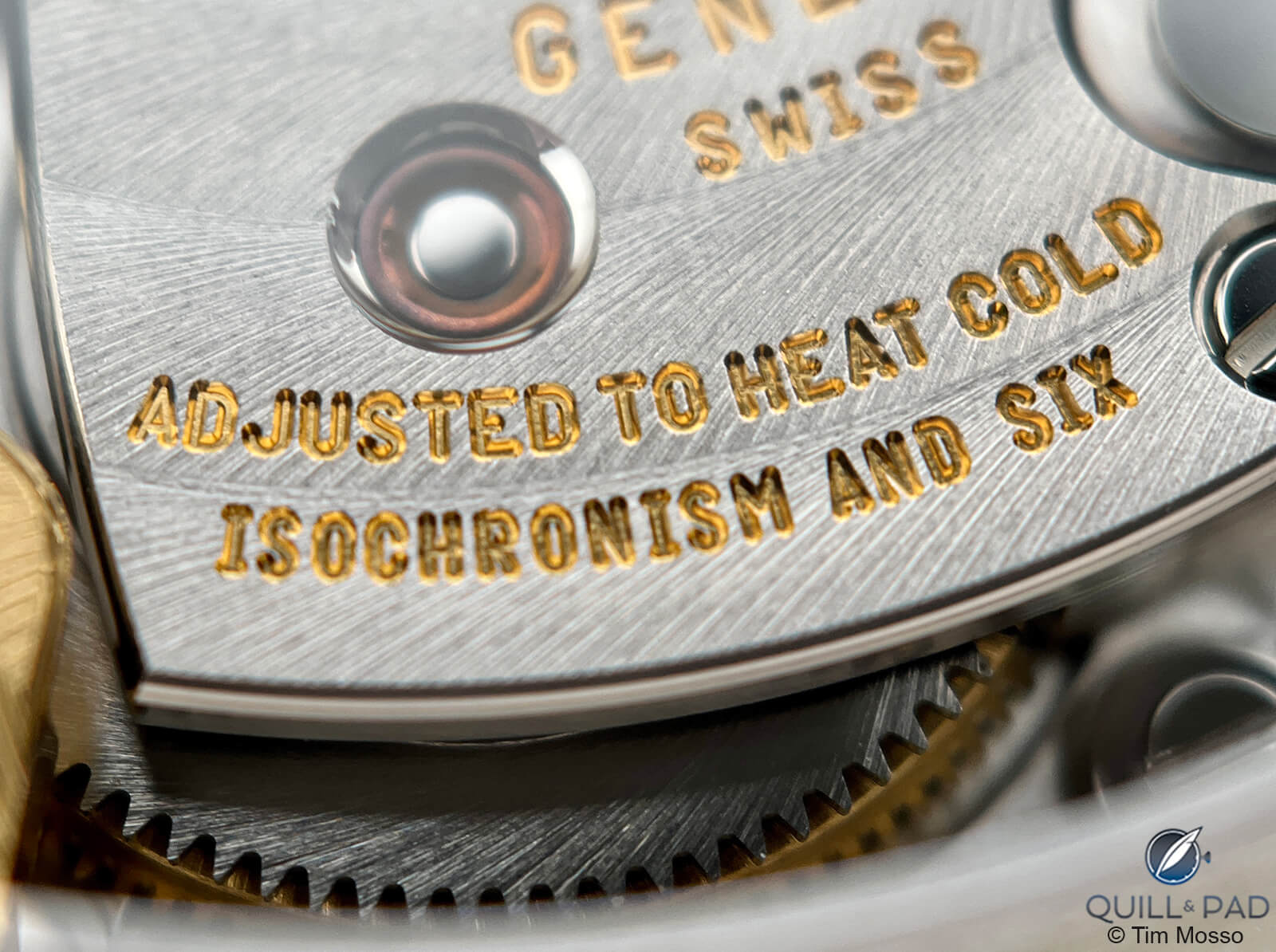
Patek Philippe Pilot Travel Time Chronograph
Patek guarantees this movement to run no worse than -3/+2 seconds per 24 hours. While the bias in favor of time loss is a strange decision, both tolerances are superior COSC -4/+6 seconds/day timing test.
From a power reserve standpoint, there are two paths you can go by, but in the long run, it’s 45 hours with the chrono on. There’s still time to change the road you’re on, and this engine will cruise to 55 hours of autonomy with the stopwatch inactive.
Movement finish is where this watch sets itself apart from both its peers and more expensive Patek Philippe models. Forget the pilot’s watch genre; the Patek’s blend of machine and hand finish is far more convincing than that on volume models from, Audemars Piguet, Richard Mille, F.P. Journe, Moser, and even Vacheron’s automatic winding chronographs.
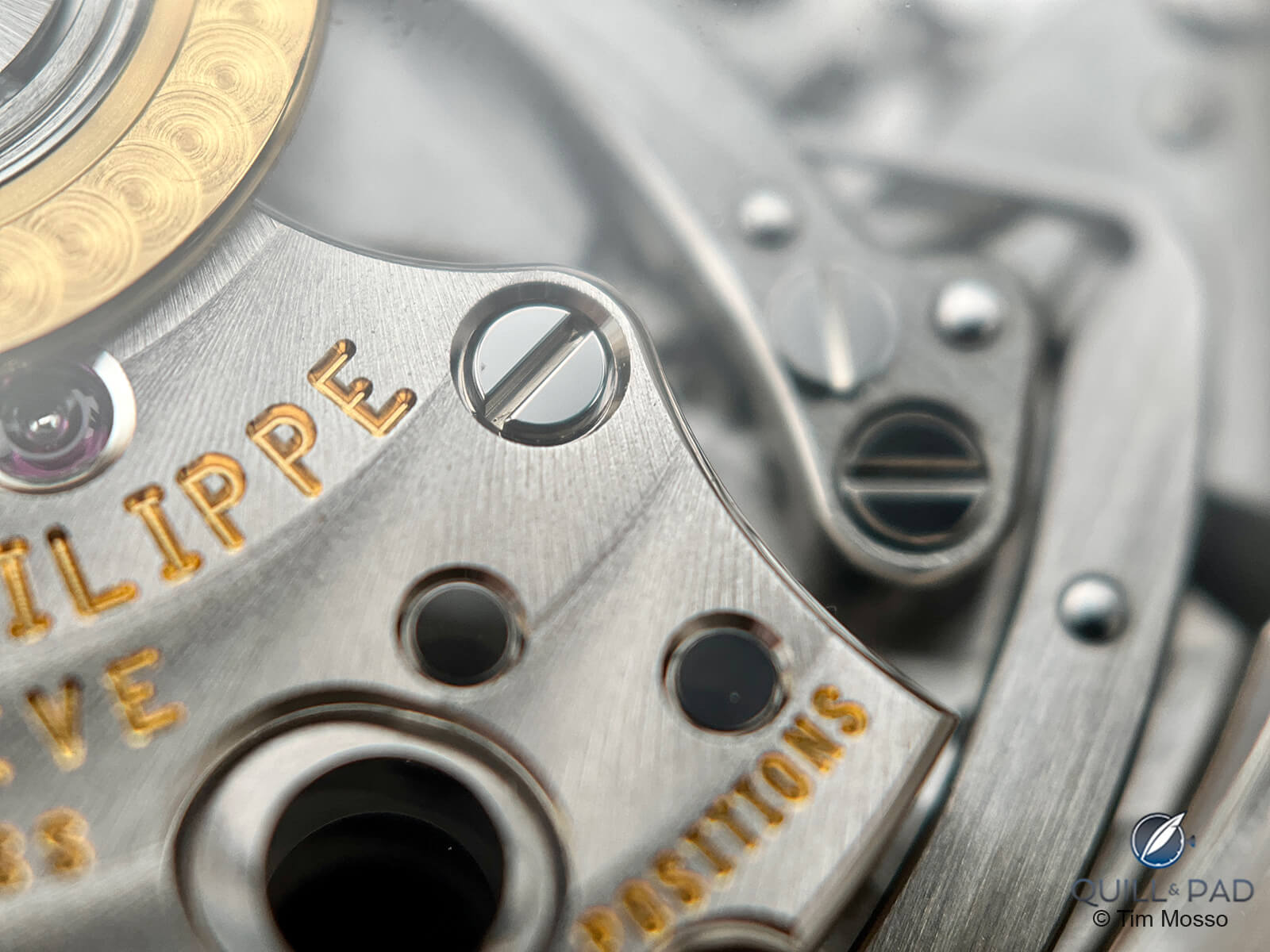
Nicely, but not elaborately finished bevels of Patek Philippe Pilot Travel Time Chronograph
For example, CTTP bevels aren’t elaborate, but they do look rounded rather than straight and mirrored rather than machine-textured with milling marks. Those marks are surprisingly common on $50,000+ watches, and this shouldn’t be the case. Advantage, Patek.
That said, Patek’s own upscale alternatives like the manual-wind 5172 exhibit more time spent on details. Moreover, there’s a clean break at Patek between vertical clutch chronographs and lateral clutch chronographs. Because the latter have far more of the mechanism visible, Patek invests vastly more time decorating these components for the owner’s enjoyment.
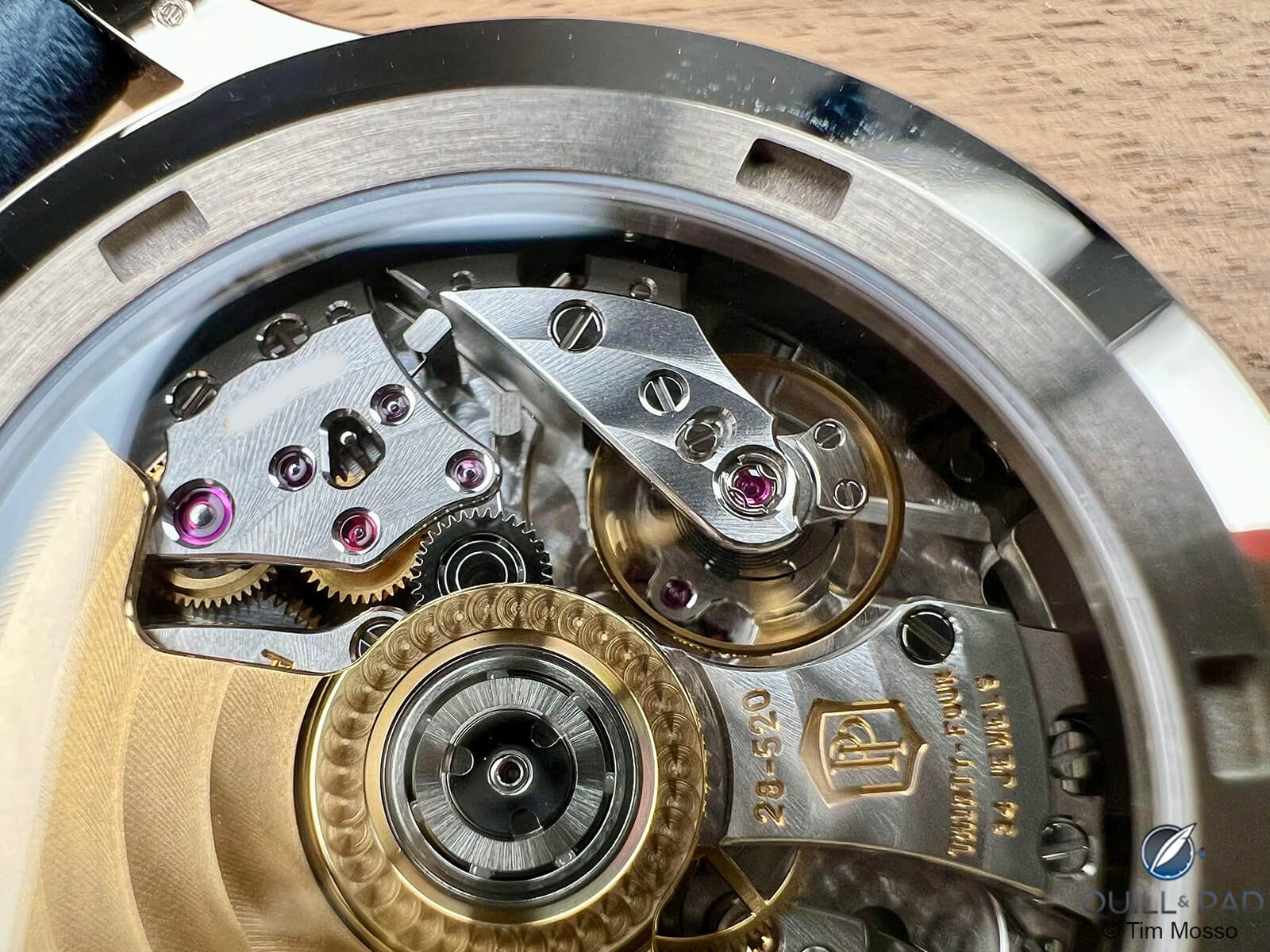
Movement of the Patek Philippe Pilot Travel Time Chronograph
Automatic winding vertical clutch chronographs usually don’t leave much of the underlying machine exposed, so temper expectations when viewing such a caseback.
None of the foregoing should suggest that the 5924G isn’t a star and a standout. For all the practical reasons above, this is a fantastic candidate to be your only Patek Philippe, your only watch, or both. This is an everyday option from the House of Stern, and a complication for everyone from travelers to business professionals to parents who coach youth soccer.
All of its functions are practical, it’s easy to read, and white gold is the only gold you can wear in plain sight without drawing the wrong kind of attention.
Markups on 5990s rob them of their power to please at anything like rational money. The relative value of the comparable 5924 is that you can find, buy, and wear it without feeling like you’re putting a major asset class at risk. At this point, Nautilus owners of all stripes increasingly feel self-conscious wearing their suddenly mainstream-recognizable and six-figure “investments.”
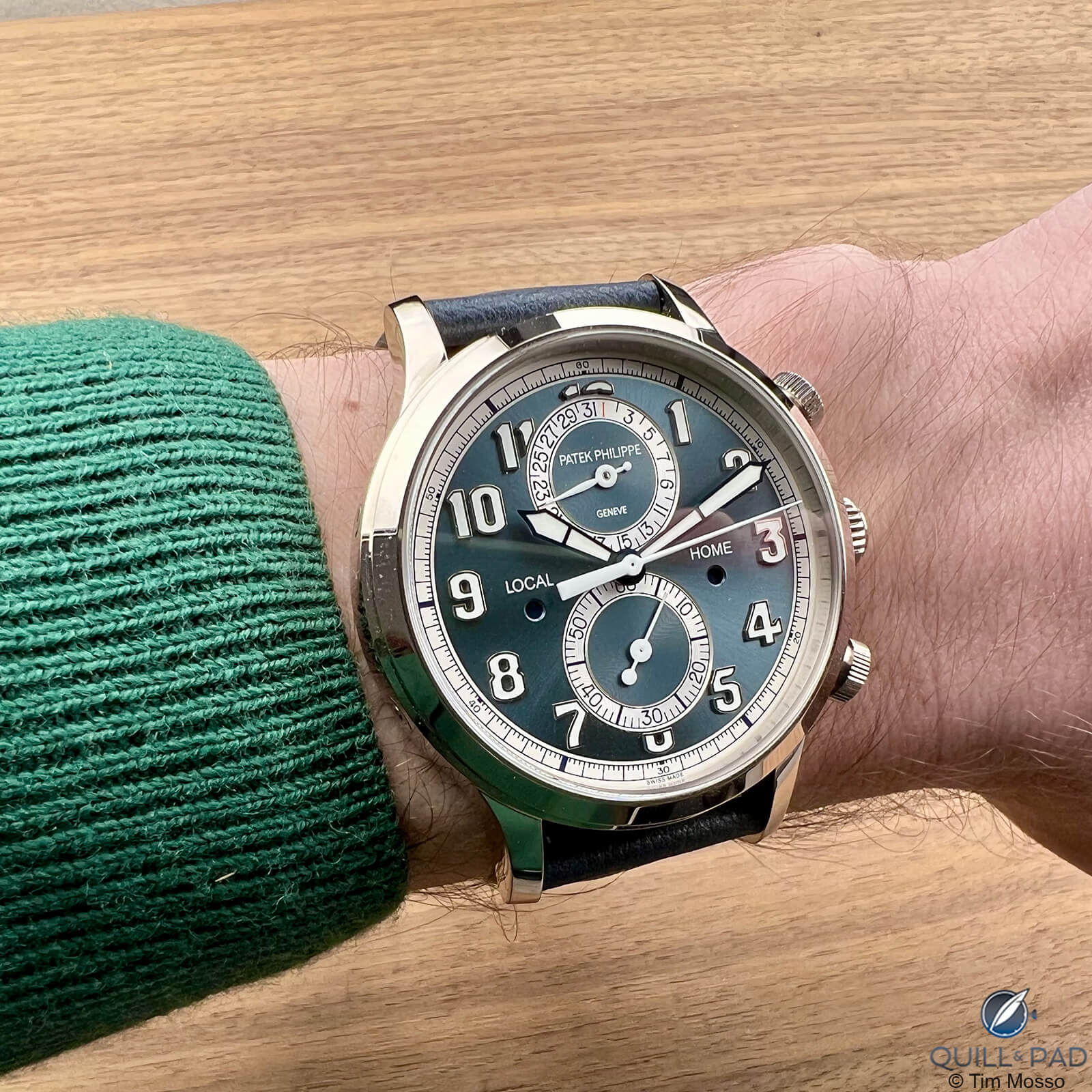
Patek Philippe Pilot Travel Time Chronograph on the wrist
The 5924, in comparison, is a watch. While still big-picture expensive and unsuited to welterweight wrists, it’s a constant companion in waiting that can be enjoyed for what it is.
For more information, please visit www.patek.com/en/collection/complications/5924G-001
Quick Facts: Patek Philippe Pilot Travel Time Chronograph
Edition: Regular production
Reference Code: 5924G-001
Case: 42mm in white gold, 13.3mm thick, 52mm lug-to-lug; 30-meter ater resistence, push down crown, dimple-style pusher adjusters for travel hour and date
Clasp: Patek Pilot-style white gold pin buckle
Dial: Sunburst blue-grey, white gold Arabic numerals, am/pm for home and local time zones, chronograph minutes to 60, radial date, broadsword hands
Movement: CH 28-520 C FUS, automatic, 55-hour power reserve, 4Hz, column wheel with vertical clutch, six-position adjustment, silicon hairspring, free sprung balance, 34 jewels, 31mm diameter; -3/+2 second per 24 hours or better from factory
Functions: Flyback chronograph, date, twin 12-hour time zones with am/pm, date
2024 Retail Price: $76,000
2024 Preowned Price: $70-$76,000
* Tim Mosso is the media director and watch specialist at Watchbox. You can check out his very comprehensive YouTube channel at www.youtube.com/@WatchBoxStudios/videos.
You might also enjoy:
Heavyweight Bout: Patek Philippe Reference 5170P vs. 5070P (Plus 5070P-013 ‘London’ Edition) Chronographs
Patek Philippe Reference 5101: Magnum Opus with Concealed Ten-Day Tourbillon
Patek Philippe 5002 Sky Moon Tourbillon: The Most Complicated Wristwatch Produced by Patek Philippe
Why I Bought It: Patek Philippe Reference 3940P-027 Vintage Collection



Leave a Reply
Want to join the discussion?Feel free to contribute!